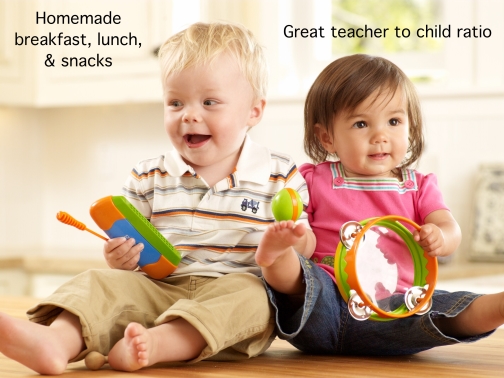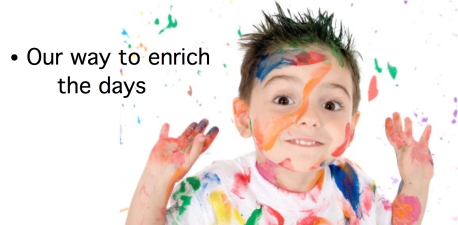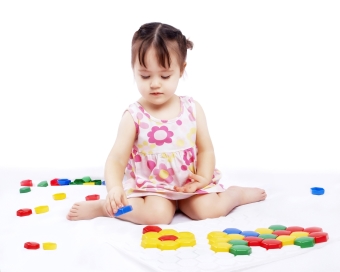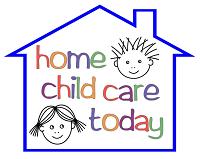Toddler Program

Toddlers are in the most interesting stage compared to the rest of their early childhood. Their minds are developing rapidly. One day, a toddler is barely able to copy words out of your mouth, then a few weeks later, he or she could communicate with you in combinations of words. Every couple of weeks, you could find your toddler pick up a new skill or a new "behavior". Their minds are in the verge of awakening. Observing a toddler carefully, one would find flocks of growing opportunities presenting themselves in all areas such as social awareness, communication, self-help, academics, and self-esteem. For an educator, it is a great planting season and "planting" is exactly part of our mission.
Rapid mind development can boost certain abilities from toddlers that could also lead to some fascinating phenomena, one example is having tantrums. Some abilities are the desire to act like a big kid or parent, the power of imagination, or communication awareness. The desire to act like growing-ups can drive a toddler to copy others and learn skills. Also, it could frequently put the toddler's not-fully-developed skills to the test and let the toddler face situations which could frustrate or scare him or her. The enhanced power of imagination can let a toddler be creative and playful, which can help the child to learn. It also brings new ideas to the toddler such as "monsters" before he or she can fully understand the concept. The boosted communication awareness can drive a toddler to pick up words. However, if the child's vocal development is not there yet the child will be frustrated. In this stage, flocks of issues would also present themselves in all areas of a toddler's development.
We think that managing or pacifying the issues is a only temporary solution, so instead, we go to the root of the problem. We also believe that every issue represents a learning opportunity to the toddler in a special form. We would use the chance to not only educate the child in dealing with the issue but also build a stronger bond with the child in the process. We would earn the trust from the child and increase the bond which is critical for future education purposes. Here are some real life examples:
Mood Swings
Driss was 15 months old and had been with us since he was 3-4 months old. He was well developed. He could walk very well and he was growing to be more independent and starting to explore his surroundings. Every morning after breakfast we could see his enthusiasm to do free play with the other children. We were happy with his development, though, he did have some issues with his sense of security. This made his free play only last for 15 minutes because he would suddenly start to cry. After we investigated and ruled out some possibilities, such as if a child took his toy or if he had some physical condition such as lack of sleep or sickness, we suspected that he was troubled by something on his mind. We had a theory that the reason why he would always start to cry after 15 minutes of play was because this was when he would start to realize that he was no longer with his provider and didn't feel a sense of security and that the initial 15 minutes were just a distraction to him. Based on this, we came up with a solution. Through out his play time, every ten minutes, I would redirect his attention to me and pick him up and play with him in my arms for 2-3 minutes. He would resume his original play time after that. Me playing with him simply reminded him that I was there for him and that made him more happy and secure. Before this, he would play only fifteen minutes and the rest of play time crying. Now it was the very opposite. He would only be by my side for fifteen minutes total and spend the rest of the time playing. Eventually, after a couple of months, he was out of his faze and was able to play on his own.
Monsters and Magical Strawberries
Samuel was about two years old and had already established good bond with me. Also, he had good napping routines and could sleep on his own. Though, one day his mother notified that at home, Samuel had been experiencing sleep trouble. In the past, when he would wakeup in the middle of night, he would cry only a little and go back to sleep. But now, his parents would have to go in and comfort him and in most cases he wouldn't be able to fall back asleep soon. After I talked to Samuel and his family, I learned that Samuel had an idea of monsters and that the monsters were the things that frightened him making him wake up. When he would wakeup, he would be alone and afraid, making it hard for him to go back asleep. I prepared a strategy for him in case that he would need help in the daycare. Then after a couple weeks, the same thing happened at the daycare and I went into his room to try to help him:
"Are you crying because your afraid of monsters?" I asked.
He sniffled and nodded.
"Do you want me to tell you a story about a boy who also woke up in the middle of the night afraid of monsters?"
"Yes" He mumbled.
"Once upon a time there was a little boy who learned about monsters. He would wake up in the middle of his nap and in his mind were full of scary monster thoughts. When he woke up, he would find that he was alone in his room. He would be so scared that he started to cry and not be able to go back to sleep. One day, his mother showed him a strawberry that had magical powers that could bring courage and repel the monsters away. After the boy possessed the magical strawberry, he was no longer afraid of monsters and was able to sleep soundly. Samuel, do you want that strawberry?"
He nodded again. I reached into my pocket, took out a prepared plastic strawberry, and handed it to him. He reached out and took it into his hand, holding it tightly.
I asked, "Do you feel better now?"
"Yes," He said.
"I'm going to check around the house for monsters and in that time, this strawberry will keep you safe. I want you to hold on to this strawberry and lie down and close your eyes."
I walked out of the room and 10 minutes later I checked back into his room. I saw that he was sleeping soundly.

After that day, no monsters bothered Samuel's nap again.
Enrichment Program
We are proud of having a highly effective enrichment program. It is based on our own recipe with ingredients such as variety, fun, and encouragement. The success of our program depends on the fact that we carefully track each child's progress and appetite to work in a learning project. Based on this information of the child, we customize a set of activities of the learning project for him or her.
For instance, we have a learning project about quantity and numbers. Its materials includes row counting, skip counting, quantity awareness(counting/quantifying, and quantity representations), simple addition, simple subtraction, and concepts of zero & negative. This learning project helps a child's cognitive development, language development, and fine motor skills. Typically, the project applies to toddlers till they are 4 years old.

Suppose we have a child named Joe who is going through the project. He has a good concept of 2 but is confused with 3 and up. He is also interested in the project but has a short attention span. He likes group games and loves stories. Based on this information, we could customize a set of activities for him. First of all, he would be benefited from observing other advanced children counting objects or doing simple addition. We would also pay attention to him in our interactive story time. His teacher would plan a few counting-I-Spy games in the story time based on pictures in story books (e.g. I-Spy 3 little pigs). When Joe plays treasure hunt during play time, his teacher can do the treasure hunts with multiple treasures for him (e.g. to find 5 hidden objects to complete the hunt). These show the basic idea about how we use the information on Joe. We use the things he likes to help him with the concept of 3 and up.
In reality, we go even farther than the idea outlined here. We do this in practice because we believe that every person has his or her own unique signature of learning. For Joe, we would read and understand him much more before doing anything. For example, we would see if he has a good bond with us, if he has basic knowledge of the area he is going to learn next, and his learning behavior. Making sure that a child has a good bond with us is an important element of this program. This is so because young children can only effectively interact with someone whom they can trust and feel right with.
All of the children grown up from our daycare (from infant to Pre-K) are doing very well in kindergarten. They can all do simple arithmetic, read, and enjoy art and music. Some of them can even handle carry-over addition, time, calendar, maps, and level 4 or 5 children's books. They are all extremely comfortable with academic works and what makes us happy is that all of them have great learning appetites and good attention spans, and they are also interested in exploring new things.

